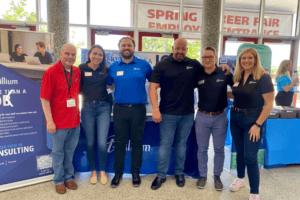How to Attract and Retain the Best Supply Chain Workforce

As they steer through increasingly complex supply chain challenges, companies stay laser-focused on navigating the talent war and attracting the right people for the job.
The intense supply chain challenges that accompanied the pandemic heightened a war for talent that had already been brewing inside the supply chain field. Now, even as pandemic-driven supply chain challenges fade, attracting, recruiting, and retaining workers remains crucial.
“The war for supply chain talent is still very much alive,” says Brian Higgins, principal of the Advisory Services practice at KPMG, a professional services firm. “Broader supply chain stress has regained some stability, but the talent issue is still top of mind.”
Securing and keeping that talent has never been more important. Prioritizing recruiting and retaining workers is “absolutely essential” to success for companies in the supply chain field, says Mark McCullough, CEO of Gebrüder Weiss USA, a transport and logistics company.
“Staffing shortages and employee turnover are extremely disruptive for supply chain companies and attracting top talent should be an ‘always-on’ activity,” McCullough says.

For the Gebrüder Weiss team (l. to r.)—William Wang, CFO; Merlin Dow, director of sales; Mark McCullough, CEO; and Young Lee, national key account manager—attracting top talent is an “always on” activity.
Complicating matters, “the playbook for attracting and retaining workers continues to shift,” Higgins says. In addition, the supply chain has “a wide spectrum of roles and skills, and it has grown increasingly more complex.”
A Growing Field
Attracting and retaining a workforce is particularly critical in light of the growth that the supply chain field is seeing.
“The supply chain sector is quickly growing; in fact, the Bureau of Labor Statistics projects that supply chain jobs are on the rise at twice the rate of all other jobs in the United States,” says Taylor Jackson, director of logistics for SC Competes, a nonprofit focused on economic growth in South Carolina. “Without people working in supply chain, our whole economy falters and goods cannot get to consumers.”
As a result, “Employers must be laser-focused on attracting new talent and even more focused on retention in today’s job market,” notes Andrea Nicholson, senior campus recruiter for transportation and technology company Arrive Logistics.
Supply chain challenges during the pandemic helped spread the word about the field, but that new awareness brought limited benefits.
“The challenges we faced as a result of a pandemic garnered a lot of publicity, but it didn’t make freight forwarding or shipping any more glamorous,” McCullough says. “It helped raise people’s awareness and interest, but it’s not like we had applicants beating down our doors.”
Promoting the supply chain field and the myriad career possibilities it offers remains a priority for those who work in the industry—beyond just recruiting for their own positions. Often, companies working in the supply chain compete not just with their peers but with other industries as well for the best talent.
Still, the supply chain’s time in the spotlight in recent years has driven home its importance, and highlighting its crucial role in the world is valuable in attracting new workers.
“It’s also important to emphasize opportunities for growth, the dynamic and exciting global working environment, and the wide variety of career paths that people can pursue as part of the supply chain,” McCullough says.
In her role, Jackson says many of her efforts are focused around creating an awareness of supply chain and logistics.
“While COVID made more people aware of the supply chain, I can still walk into a room of educators or students, ask ‘who knows what logistics is?’ and get blank stares,” Jackson says. “I hope to change this.”

Connecting with high school students to educate them on the job opportunities around supply chain and logistics has proven to be a successful recruiting strategy for many companies.
Reaching Students
As one action, SC Logistics partners on programs with the Association of Supply Chain Management, including two outreach efforts for students—Lemonade Supply Chain (targeting 4th–5th grade) and Cell Phone Supply Chain Program (targeting 11th–12th grade).
“Connecting with elementary school and middle school children to show them the endless job opportunities around supply chain and logistics is so important,” Jackson says.
“It also is necessary to ‘teach the teacher’—we need to create an awareness around supply chain and show that this field is stable, in demand, and fun to work in,” she says.
“As we start to focus on additional job training—career technical education for example—we need to open up the pipeline for these jobs to be filled by students and the next generation,” Jackson adds.
The growing trend of higher education institutions featuring the supply chain more prominently in their curricula offers a clear benefit for the supply chain as a whole.
“The supply chain has long suffered from talent shortages for entry positions because you need a balance there,” Higgins says. “You need the analytics and technical skills, and you need some supply chain expertise. It’s not the easiest thing to recruit.
“The probability of having success with that talent base will increase if university systems and academia reinforces it,” he adds.
It is important to express to students and others considering supply chain jobs that it’s not easy work but that it’s exciting and dynamic.
“People want to see the world, they want to experience what it’s like out there, and they don’t want doldrum jobs where it’s a repeat day after day,” McCullough says. “That’s certainly not what you get in logistics.”
A Changed Landscape
As a sign of the steep competition for supply chain talent in the current climate, Nicholson notes that the class of 2023 applied to more jobs sooner than any other graduating class before them.
“This challenges employers to rethink their value propositions to continue to be an employer of choice, and reevaluate hiring timelines and keep-warm strategies, among other things,” she says.
In general, the recruiting landscape has evolved in recent years, particularly among graduating college students.
“Students apply to more jobs sooner, consistently ranking pay and compensation as their top consideration factor, and valuing work-life balance more than students who have graduated before them,” Nicholson says. “Students also value a culture where diversity, equity, inclusion, and belonging is woven into every aspect of the job and the work environment.
“Placing a greater emphasis on workers’ sense of inclusion is critical to not only attract new talent but also to retain that talent, even as early as the intern level,” she adds.
Withdrawals from job offers have increased immensely across all industries, creating new challenges.
“Fostering a sense of belonging and contribution, and ensuring new hires are exposed to the culture early in the recruitment process helps to deter such withdrawals,” Nicholson says.
The competitiveness of the labor market has prompted Arrive Logistics to strategically time its on-campus events.
“Students find us in the classroom earlier in the school year, meeting with student organizations and sharing unique event ideas, with our intention to meet them where they are,” Nicholson says. “This presence is in addition to our regular attendance at career fairs and other large-scale events later in the school year.”

David Woodworth, president of Terillium (far left) and members of his team attend a career fair. Terillium has been particularly active in recruitment at Miami University’s Center for Supply Chain Studies.
Hiring New Grads
Consulting firm Terillium formerly hired only experienced candidates. But 12 years ago, they shifted to hire new graduates that they could train, strengthening the company’s workforce in the process, according to David Woodworth, president of the company.
Woodworth graduated from Miami University, and he is highly involved in on-campus activities at his alma mater’s Center for Supply Chain Excellence. He speaks in classes, staffs the booth at career fairs, conducts on-campus interviews and hosts a case competition.
Terillium is a corporate partner of the center, and their access to students has paid off in the form of hires that have strengthened the company.
“We’ve hired about 90 students in the past 10 years, and probably 80% of them have seen me speak in class,” Woodworth says. “When we interview kids, they say they’ve never seen a president do the kinds of activity that I do and that it makes them feel like we care about them, which we do.”
Strong partnerships such as the one Terillium enjoys with Miami University work well for both sides.
“The university wants their students to get good, well-paying jobs out of college and we want good, strong students to make us better,” Woodworth says. “It makes sense that we work together.”
Return on Investment
Arrive Logistics is also a corporate partner with Miami’s Center for Supply Chain Excellence, and the relationship has given the company a “huge return on investment,” allowing it to connect with top supply chain talent, Nicholson says.
“The beauty of our corporate partnership is that a top logistics brokerage and an academic institution work together to help create value, influence curriculum, and arm students with the skills and experiences they need to succeed as contributing members of the supply chain workforce,” Nicholson says.
Gebrüder Weiss casts a wide net in recruitment and uses every tool at its disposal—from career fairs and job sites to being active on LinkedIn and serving as guest speakers and presenters at several university programs.
“Tactically, it’s helpful to use as many avenues as possible to attract new and experienced talent,” McCullough says. “Strategically, it’s impactful to market the company, the culture, and the lifestyle, not just the job tasks.”
Gebrüder Weiss’s “always on” approach to recruitment means, “We consider every touchpoint a recruiting touchpoint and every employee a recruiter, and this has been an effective strategy,” McCullough says.
Companies having the most success attracting and retaining workers are going beyond pay and benefits and focusing on a holistic worker experience. And companies that are proving to be sophisticated in adopting technology and embedding the supply chain as a true business partner are important in retention.
Rising labor costs and the increasing popularity of remote work—which is not possible for many supply chain jobs—intensifies the importance of focusing on corporate culture and being creative in what a company offers its workers to retain them.
Strategies such as effective onboarding, ongoing training, and career advancement opportunities are critical to retaining employees.
“In addition to good benefits and paid time off, flexibility, mentoring, internal communication, and a supportive culture are all important to retaining workers,” McCullough says. “Flexibility has become more important in recent years, and we have found creative ways to offer it while still keeping the work hours our customers need.
“For example, we make room for people to pursue outside passions and maintain work/life balance, and will adjust hours and responsibilities where we can to allow that flexibility,” she adds.
Gebrüder Weiss emphasizes mentorship as part of retention, turning to veteran employees to formally mentor team members. They also provide a structured education program to help workers gain career-building skills. High engagement and clear communication are critical, McCullough says.
“The biggest retainer in our experiences is giving employees a career path, and that’s more easily realized if they have good mentors,” he says.
Mobile Workforce
Gebrüder Weiss emphasizes mobility within the company and the international opportunities for workers who want to travel and take on new challenges. For instance, McCullough, an Ohio native, spent three years working in South Africa and found it to be “an experience of a lifetime that really catapulted my career,” he says.
Gebrüder Weiss strives to train workers “from A to Z in the business,” he says, rather than keeping them highly specialized to one component of it. McCullough believes employees appreciate the career advancement opportunities that come with that training.
Ten of the 12 branch managers at Gebrüder Weiss, and every member of the executive team, are internal promotions from within the company. McCullough attributes part of that stability and longevity to the company’s emphasis on mentorship and engaging with workers.
“If you can give people education, guidance, and a career path forward, then they’ll stay with you for a very long time,” McCullough says.
